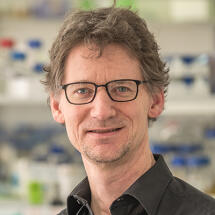Prof. Dr. Roland Wedlich-Söldner
No positions via CiM-IMPRS in 2026
Pattern formation in the cell cortex underlying generation and utilization of the membrane potential

Cell Biology / Molecular Biology
Imaging Technology
Biophysics
Actin Cytoskeleton
Membrane Organization
My group aims to understand the molecular and physical principles driving dynamic cell organization and adaptation. To tackle this complex issue, we follow a multidisciplinary strategy, integrating methods from molecular biology, biochemistry, cell biology and biophysics - with a focus on advanced fluorescence microscopy and quantitative image analysis.
Within the intended project we aim to unravel the contribution of lateral segregation and domain formation to the function, molecular regulation and utilization of ion, nutrient and proton transport systems at the plasma membrane. In particular, we will study the link between lateral distribution and function of the membrane potential generating Na+/K+ pump in mammalian cells and the function of symporters and antiporters utilizing the membrane potential for ion and nutrient transport. We will combine high resolution live cell imaging with genetic engineering, micropatterning of cells and microfluidics, electrochemical recordings and fluorescent biosensors to manipulate pH, ion gradients and the PM potential under different environmental conditions and acute stresses. Our goal is to identify fundamental rules governing the generation, regulation and utilization of the PM potential.

Vita
- 1992-1997 Studies of Biology, Ludwig Maximilians University (LMU), Munich.
- 1997-2001 Graduate student at LMU and MPI of Terrestrial Microbiology, Marburg
- 08/2001 Dr. rer. nat. in Biology at the LMU, Munich
- 2002-2004 EMBO long-term fellowship
- 2002-2005 Postdoctoral fellow, Harvard Medical School, Boston, USA
- 2005-2013 Group leader at the MPI of Biochemistry, Martinsried
- 2009-2013 HFSP Young Investigator Grant
- 2010 Visiting professor, Mechanobiology Institute, National University of Singapore.
- Since 2013 Director, Institute of Cell Dynamics and Imaging, University of Münster.
- 2017: Visiting professor, University of New South Wales, Sydney, Australia
Selected references
Bayraktar S, Nehrig J, Menis E, Karli K, Janning A, Struk T, Halbritter J, Michgehl U, Krahn MP, Schuberth CE, Pavenstädt H, Wedlich-Söldner R (2020) A deregulated stress response underlies distinct INF2 associated disease profiles. JASN 31, 1296-1313.
Busto JV, Elting A, Haase D, Spira F, Kuhlman J, Schäfer-Herte M and Wedlich-Soldner R (2018) Lateral plasma membrane compartmentalization links protein function and turnover. EMBO J 37, pii: e99473.
Wales P, Schuberth CE, Aufschnaiter R, Fels J, García-Aguilar I, Janning A, Dlugos CP, Schäfer-Herte M, Klingner C, Wälte M, Kuhlmann J, Menis E, Hockaday Kang L, Maier KC, Hou W, Russo A, Higgs HN, Pavenstädt H, Vogl T, Roth J, Qualmann B, Kessels MM, Martin DE, Mulder B, Wedlich-Söldner R (2016) Calcium-mediated actin reset (CaAR) mediates acute cell adaptations. eLife 5, e19850.
Klingner C, Cherian AV, Fels J, Diesinger PM, Aufschnaiter R, Maghelli N, Keil T, Beck G, Tolic-Nørrelykke IM, Bathe M and Wedlich-Soldner R (2014) Isotropic acto-myosin dynamics promote organization of the apical cell cortex in epithelial cells. J Cell Biol 207, 107-21.
Riedl J, Crevenna AH, Kessenbrock K, Yu JH, Neukirchen D, Bista M, Bradke F, Jenne D Holak TA, Werb Z, Sixt M and Wedlich-Soldner R (2008) Lifeact - a versatile marker for the visualization of F-actin. Nature Methods 5, 605-7.
Links
